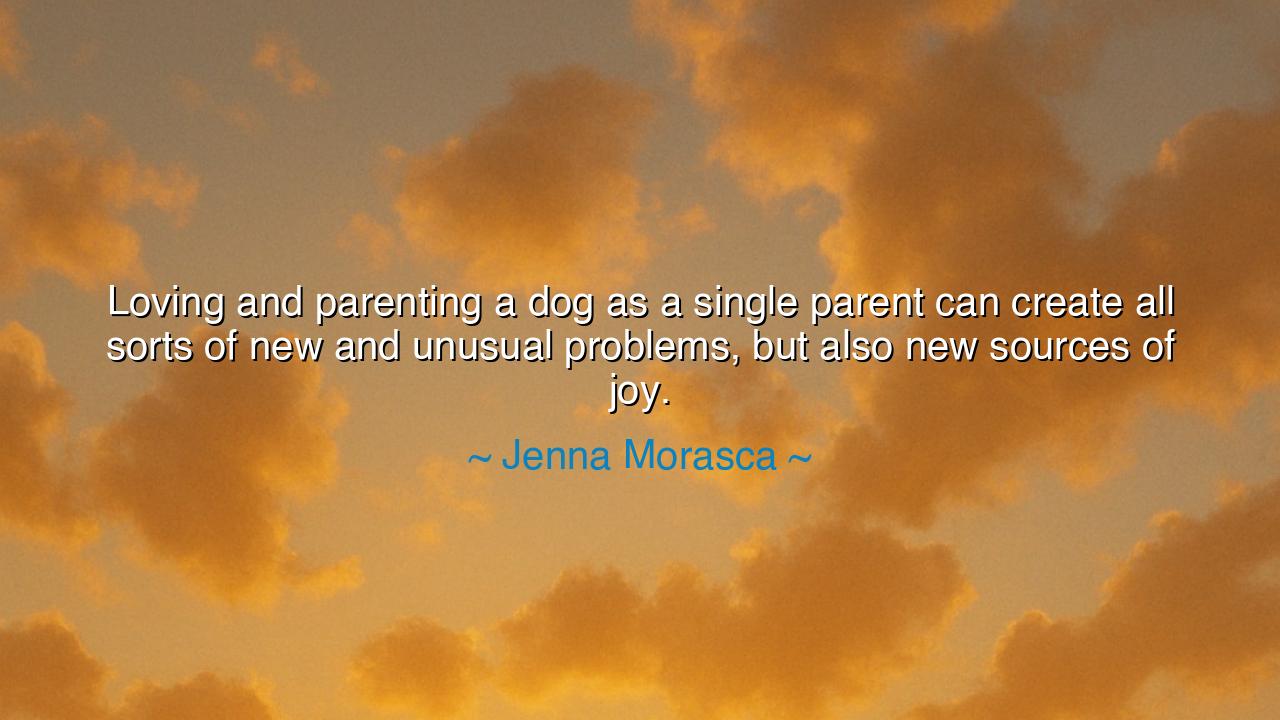
Loving and parenting a dog as a single parent can create all
Loving and parenting a dog as a single parent can create all sorts of new and unusual problems, but also new sources of joy.






Hear the words of Jenna Morasca, who speaks with tenderness and truth: “Loving and parenting a dog as a single parent can create all sorts of new and unusual problems, but also new sources of joy.” In this saying, she reveals the paradox of responsibility and love, that even in the care of creatures not human, the heart of parenting is awakened. For to nurture is to be burdened, and to be burdened is to be blessed. The dog, loyal and dependent, becomes both a challenge and a gift, especially for one who walks the path of single parenthood, bearing alone what is often shared.
In ages past, animals were not merely companions but sacred partners in survival. The ancients revered the loyalty of dogs, praising their courage in hunt and battle, their fidelity at the hearth. To care for such a creature was no small duty, for it required vigilance, patience, and affection. Thus Morasca’s words draw from an eternal truth: the one who loves and tends to another life—whether child, companion, or beast—enters into the holy labor of parenting. And though unusual problems may arise, so too do new joys, for love always multiplies itself in ways unseen.
The “new and unusual problems” she names are the practical burdens of responsibility: the long walks in storm or sun, the sudden illnesses that demand costly care, the limitations upon one’s freedom, the loneliness of making every decision alone. For the single parent, there is no partner to share the load, no one to trade shifts of care. This solitude magnifies both the difficulty and the weight of the role. Yet, in naming these trials, Morasca does not despair—she reminds us that struggle is the soil from which joy grows.
History itself bears witness to this truth. Consider the tale of Greyfriars Bobby, the faithful dog of Edinburgh, who guarded his master’s grave for fourteen years after the man’s death. The city took notice, and though the dog created many “problems” for those who tended him—feeding him, protecting him, sheltering him—his loyalty became a source of deep joy and a symbol of love’s endurance. From this story, we see the reflection of Morasca’s words: even the challenges of caring for a dog can awaken new wells of devotion and meaning in the human heart.
The “sources of joy” she speaks of are many: the wag of a tail after a long day, the quiet companionship that softens loneliness, the laughter born of play, the comfort of unconditional love. For the one who parents alone, the dog becomes not only dependent but also healer—giving affection without judgment, filling spaces of silence with warmth, reminding the weary parent that love need not always be earned. In this exchange, both are transformed: the animal receives care, and the human receives comfort.
The lesson, then, is clear: love is not lessened by its challenges, but deepened. Whether in raising children or caring for companions, the burdens borne alone can become sources of strength, shaping resilience and awakening unexpected joys. Morasca’s words invite us to see not only the hardships of single parenting—whether of humans or of animals—but also the hidden blessings that come with it.
Therefore, let all who hear these words take action: embrace the struggles of care, whether shared or solitary. Do not flee from the unusual problems, for they are proof of life’s depth. Seek joy in the loyalty of those you nurture, in their presence, in their dependence, and in your own capacity to give. For in the act of caring—whether for child, friend, or faithful creature—you will find not only burden, but also the quiet heroism of love.
Thus Jenna Morasca’s words, simple yet profound, teach us this eternal truth: to love and parent, even across species, is to face difficulty and to discover joy. And in carrying both with courage, the single parent becomes not only caretaker but also warrior of the heart, finding meaning in the labor of love.






AAdministratorAdministrator
Welcome, honored guests. Please leave a comment, we will respond soon